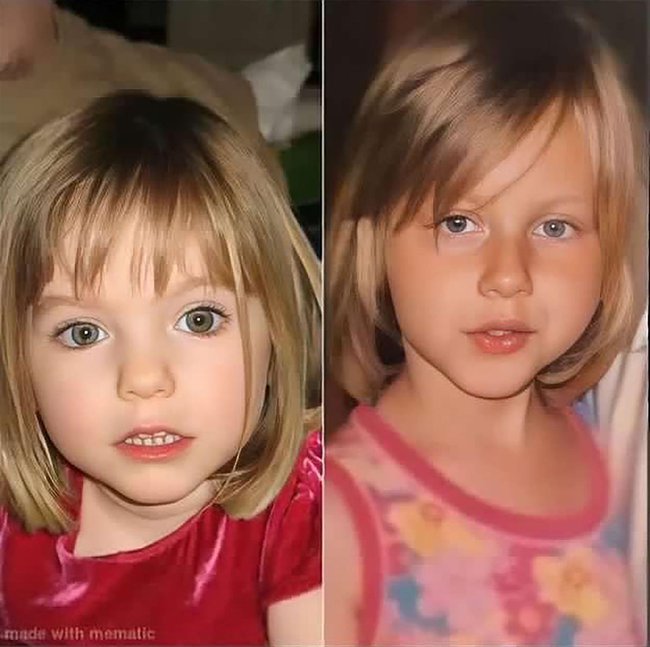In a development that has sent shockwaves across the globe, a 21-year-old woman from Poland has made a bold and controversial claim: she believes she is Madeleine McCann, the British toddler who vanished from a holiday apartment in Praia da Luz, Portugal, in May 2007. Madeleine’s disappearance at the age of three became one of the most enduring mysteries of the 21st century, captivating millions and fueling a decades-long search that remains unresolved. The young woman’s assertion, shared widely on social media, has sparked intense debate, renewed hope for some, and skepticism from others, thrusting the Madeleine McCann case back into the spotlight. Who is this woman, and what drives her claim? Could her story hold the key to solving one of the world’s most famous missing persons cases?
The Madeleine McCann Case: A Global Phenomenon
To grasp the significance of this claim, it’s essential to revisit the events of May 3, 2007. Madeleine McCann, just shy of her fourth birthday, was vacationing with her parents, Kate and Gerry McCann, and her younger twin siblings at the Ocean Club resort in Praia da Luz, a serene coastal town in Portugal’s Algarve region. That evening, Kate and Gerry dined with friends at a nearby tapas restaurant, leaving Madeleine and the twins asleep in their apartment. The parents checked on the children periodically, but at around 10 p.m., Kate returned to find Madeleine gone, her bed empty, and the window open. The discovery triggered a frantic search and launched an investigation that would become a global phenomenon.
The Portuguese police faced immediate challenges, including criticism for not securing the crime scene effectively. The case escalated into an international cause célèbre, with celebrities like David Beckham and JK Rowling amplifying appeals for information. The McCanns, both doctors from Leicestershire, UK, endured relentless media scrutiny, and in a controversial move, were briefly named suspects by Portuguese authorities in 2007 before being cleared in 2008. Despite exhaustive efforts—thousands of reported sightings, multinational police cooperation, and millions spent on investigations—Madeleine has never been found, and no one has been definitively held accountable.
A 21-Year-Old’s Bold Assertion
The latest chapter in this saga began when a 21-year-old Polish woman, identified in media reports as Julia Wendell (also known as Julia Faustyna or Wandelt), took to social media to declare that she might be Madeleine McCann. Using the Instagram handle @iammadeleinemccann, she amassed hundreds of thousands of followers by sharing posts that highlighted perceived similarities between herself and Madeleine, including physical traits like a rare eye condition (coloboma), freckles, and facial features. She also claimed to have fragmented memories of her childhood and expressed doubts about her official age, noting that Madeleine, if alive, would be around 19, while she is 21. Julia suggested that discrepancies in her personal history, such as a lack of early childhood photos or clear parental records, led her to question her identity.
Julia’s campaign gained traction after she alleged that she was abused as a child by a German pedophile who resembled a suspect in the McCann case. She claimed to have reached out to the McCanns and requested a DNA test to verify her identity, asserting that Kate and Gerry agreed to the procedure. Her posts, which included side-by-side comparisons of her features with Madeleine’s and emotional pleas for help, went viral, drawing a polarized response from the public. While some championed her cause, urging authorities to investigate, others accused her of fabricating the story for attention, and her family in Poland publicly disputed her claims, stating that she is their daughter and has a documented history.
DNA Testing and the Quest for Truth
The cornerstone of Julia’s claim is her call for DNA testing, which could definitively confirm or refute her connection to the McCanns. DNA technology has advanced significantly since 2007, enabling precise comparisons with samples from Madeleine’s family. Reports indicate that a DNA test was conducted in 2023, with results confirming that Julia is of Polish descent, with minor Lithuanian and Russian heritage, and not related to the McCanns. Despite this, Julia has continued to assert her belief, even attending a vigil in the UK in 2024 to mark 17 years since Madeleine’s disappearance, where she reiterated her request for further testing. The McCanns have not publicly commented on the results, but sources close to the family suggest they remain open to exploring credible leads while prioritizing their ongoing search efforts.
Beyond DNA, Julia’s case raises questions about memory and identity. She has described having few recollections of her early years, a trait that could align with the experiences of a child abducted at a young age, as trauma can disrupt memory formation. However, psychologists note that such gaps can also result from other factors, including mental health challenges or suggestive thinking. Julia’s spokesperson, Dr. Fia Johansson, a psychic medium and private investigator, has described her background as “complicated” and suggested that her mental health struggles may influence her convictions. This complexity underscores the need for a sensitive, evidence-based approach to her claims.
Public Reaction: A Divide Between Hope and Doubt
The response to Julia’s claim has been deeply divided. On social media, her @iammadeleinemccann account, which at its peak had nearly a million followers, became a lightning rod for debate. Supporters argue that her physical similarities and childhood uncertainties warrant serious investigation, especially given the lack of closure in Madeleine’s case. They point to her persistence, including her appearances on platforms like the Dr. Phil show in 2023, as evidence of her sincerity. Critics, however, view her actions as exploitative, noting that her claims have caused distress to the McCanns and diverted attention from legitimate investigative efforts. Some have pointed to her history of seeking public attention, including aspirations to be a singer or model, as a possible motive.
The controversy has also highlighted the emotional toll on the McCann family, who have faced numerous false claims over the years. Each new assertion reopens old wounds, forcing Kate and Gerry to navigate a delicate balance between hope and skepticism. Their official campaign, Find Madeleine, continues to operate, supported by public donations and focused on pursuing verifiable leads. The family’s silence on Julia’s case reflects their cautious approach, as they avoid fueling speculation while cooperating with authorities behind the scenes.
The Broader Context: False Claims in High-Profile Cases
Julia’s story is not an isolated incident. High-profile missing persons cases, like Madeleine’s, often attract individuals who claim to be the missing person or possess key information. These claims can stem from genuine confusion, psychological conditions, or a desire for attention. In Madeleine’s case, several others have made similar assertions, only to be disproven through investigation or testing. The global visibility of the case, amplified by media coverage, documentaries, and social media, makes it a magnet for such claims, each one complicating the search for truth.

The phenomenon also reflects broader challenges in missing persons investigations. Advances in technology, such as facial recognition and genetic databases, have improved the odds of resolving cases, but the passage of time remains a significant hurdle. Madeleine, if alive, would be in her early 20s, and age-progression images have been used to aid the search. Yet, without concrete evidence, claims like Julia’s risk becoming distractions, consuming resources and emotional energy that could be directed elsewhere.
The Ongoing Investigation: Where Things Stand
The Madeleine McCann case, codenamed Operation Grange in the UK, remains active, with British and Portuguese authorities collaborating on new leads. In recent years, attention has centered on a German suspect, Christian Brueckner, a convicted sex offender who lived in the Algarve between 1995 and 2007. Named a suspect in 2020, Brueckner has denied involvement, and no charges have been filed in connection with Madeleine’s disappearance. Searches, including a 2023 operation at a Portuguese reservoir, have yielded no significant breakthroughs. Julia’s claim, while high-profile, has been largely dismissed by investigators, with Polish police in 2023 stating that her version of events was not credible.
The case continues to evolve, with authorities balancing the need to explore every lead against the risk of chasing false hopes. Julia’s persistence, including her travel to the UK and her arrest in 2025 at Bristol Airport on suspicion of stalking the McCanns (a charge her representative called “nonsense”), underscores the challenges of managing public involvement in such a sensitive investigation. Her actions have kept Madeleine’s name in the headlines, but they have also complicated the narrative, raising questions about the ethics of public speculation.
A Mystery That Endures
The claim by a 21-year-old Polish woman to be Madeleine McCann is a poignant reminder of the case’s enduring grip on the public imagination. For nearly two decades, Madeleine’s disappearance has transcended borders, becoming a symbol of loss, hope, and the quest for answers. Julia’s story, whether driven by genuine belief or other motives, has succeeded in renewing attention to the case, prompting discussions about missing persons and the power of social media to amplify individual voices.
For Kate and Gerry McCann, the search continues. They have spoken of their resolve to never give up, maintaining hope that Madeleine is alive while confronting the uncertainty of her fate. The public remains deeply invested, drawn to the case by a mix of empathy and curiosity. As investigations proceed, the world watches, hoping that one day, the truth about Madeleine McCann will emerge, bringing closure to a mystery that has haunted millions.





